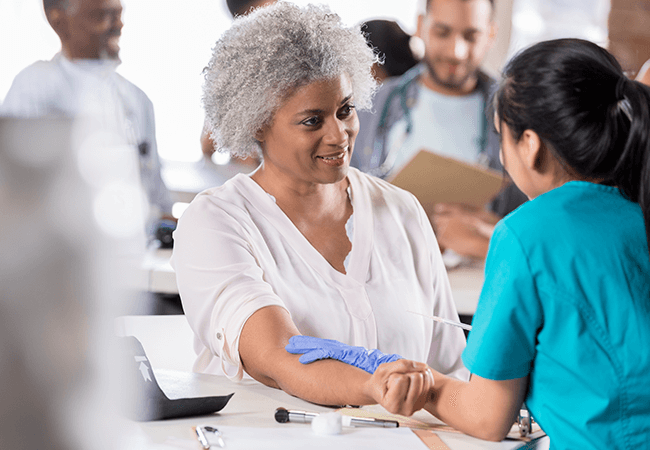
Jun 14, 2019
Volunteering, Advocating, Caring: How Nurses Build Health, In Their Words

Ask people on the street how nurses are building a healthier America, and you’ll get dozens of responses. You’ll hear of the nurse who gave someone their annual physical, or cared for them in a hospital, or helped a child at school when she got sick.
All good answers. But ask a nurse the same question—as we did last fall, online—and you’ll get some eye-opening replies:
- “By sharing fresh produce from our farm.”
- “By encouraging people to eat right. Fruits, veggies and vitamins.”
- “By sharing my nursing knowledge with co-workers at a non-nursing job I have.”
- “Voting.”
- “Registering voters!”
This array of rejoinders reflects the fact that nurses are everywhere: in schools, workplaces, homes, hospitals, assisted living facilities, and other community spaces. It also shows that nursing is more than a job—it is a state of mind.
Below are just a few of the other responses nurses gave when asked to finish this sentence:
I am building a healthier America by …
- Doing research on brain aneurysms as a registered nurse.
- Immunizing students!!
- Teaching future nurses.
- Teaching people that healthy eating and exercise are better than medicine.
- Helping keep nursing home patients and residents out of the hospital.
- Educating & empowering patients & their families.
- Teaching, understanding, and caring.
- Lifting spirits of the sick, healing the broken, smiling and listening to those in a dark place, to bring light to their hearts, hope and joy.
- Teaching hand-washing and encouraging flu vaccinations!
- Recommending immunizations to my patients.
- Trying to correct falsehoods about health and health care I see posted on Facebook. Wish me luck!!
- Advocating for quality care for underserved populations.
- Working in a volunteer clinic run by RNs.
As to the last, several nurses mentioned volunteering as a way they contribute to better health. One of them, Colleen Sullivan, said she is a retired RN who volunteers at a program for low-income families: “I simply take weights and blood pressures. Do basic counseling based on the American Heart Association guidelines. Provide basic nutritional information. And make health care referrals. Makes a huge difference for these families.”
Sullivan wrote in a follow-up email of her passion for volunteering, especially since she retired:
The families at this program are mostly low-income Hispanic. Most have the barest of insurance coverage or even none at all. … Often I explain how medications should be taken because they didn’t understand what the doctor told them. And I explain what their health care rights are. Finding out they are entitled to an interpreter by law [Title VI of the Civil Rights Act] was a big surprise to most of my clients.
The biggest problem I’ve found is something I’ve long fought, the disparity of care due to income and color. If I went to the doctor with a blood pressure of 160/90, I’d come away with a handful of prescriptions and tests. I send these folks to the doctor with the same blood pressure, too often they are told not to worry, they’re fine. I now have them look up the blood pressure with the phrase ‘Is my blood pressure of …. bad’ and show the doctor to get the treatment they deserve. This little trick seems to work!”
In sum, the answers are inspiring and complex, which reflects the profession and people in it. Given the multifaceted nature of nursing, perhaps the one commenter who framed all answers best was the one said simply:
“By being a nurse.”
Links to the original posts are:
https://www.facebook.com/140404299480896/posts/1036790903175560
https://www.facebook.com/140404299480896/posts/1036789249842392
https://www.instagram.com/p/BqSggp_gO02/#
https://www.instagram.com/p/BqSg6ApgHIb/#
